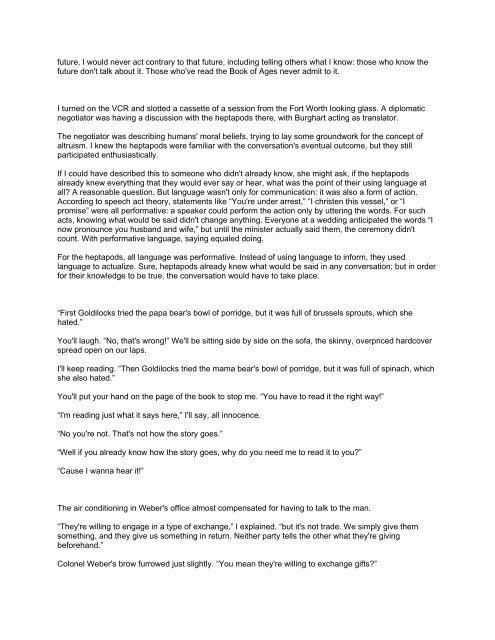Create successful ePaper yourself
Turn your PDF publications into a flip-book with our unique Google optimized e-Paper software.
future, I would never act contrary to that future, including telling others what I know: those who know the<br />
future don't talk about it. Those who've read the Book <strong>of</strong> Ages never admit to it.<br />
I turned on the VCR and slotted a cassette <strong>of</strong> a session from the Fort Worth looking glass. A diplomatic<br />
negotiator was having a discussion with the heptapods there, with Burghart acting as translator.<br />
The negotiator was describing humans' moral beliefs, trying to lay some groundwork for the concept <strong>of</strong><br />
altruism. I knew the heptapods were familiar with the conversation's eventual outcome, but they still<br />
participated enthusiastically.<br />
If I could have described this to someone who didn't already know, she might ask, if the heptapods<br />
already knew everything that they would ever say or hear, what was the point <strong>of</strong> their using language at<br />
all? A reasonable question. But language wasn't only for communication: it was also a form <strong>of</strong> action.<br />
According to speech act theory, statements like “You're under arrest,” “I christen this vessel,” or “I<br />
promise” were all performative: a speaker could perform the action only by uttering the words. For such<br />
acts, knowing what would be said didn't change anything. Everyone at a wedding anticipated the words “I<br />
now pronounce you husband and wife,” but until the minister actually said them, the ceremony didn't<br />
count. With performative language, saying equaled doing.<br />
For the heptapods, all language was performative. Instead <strong>of</strong> using language to inform, they used<br />
language to actualize. Sure, heptapods already knew what would be said in any conversation; but in order<br />
for their knowledge to be true, the conversation would have to take place.<br />
“First Goldilocks tried the papa bear's bowl <strong>of</strong> porridge, but it was full <strong>of</strong> brussels sprouts, which she<br />
hated.”<br />
You'll laugh. “No, that's wrong!” We'll be sitting side by side on the s<strong>of</strong>a, the skinny, overpriced hardcover<br />
spread open on our laps.<br />
I'll keep reading. “Then Goldilocks tried the mama bear's bowl <strong>of</strong> porridge, but it was full <strong>of</strong> spinach, which<br />
she also hated.”<br />
You'll put your hand on the page <strong>of</strong> the book to stop me. “You have to read it the right way!”<br />
“I'm reading just what it says here,” I'll say, all innocence.<br />
“No you're not. That's not how the story goes.”<br />
“Well if you already know how the story goes, why do you need me to read it to you?”<br />
“Cause I wanna hear it!”<br />
The air conditioning in Weber's <strong>of</strong>fice almost compensated for having to talk to the man.<br />
“They're willing to engage in a type <strong>of</strong> exchange,” I explained, “but it's not trade. We simply give them<br />
something, and they give us something in return. Neither party tells the other what they're giving<br />
beforehand.”<br />
Colonel Weber's brow furrowed just slightly. “You mean they're willing to exchange gifts?”



